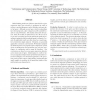Free Online Productivity Tools
i2Speak
i2Symbol
i2OCR
iTex2Img
iWeb2Print
iWeb2Shot
i2Type
iPdf2Split
iPdf2Merge
i2Bopomofo
i2Arabic
i2Style
i2Image
i2PDF
iLatex2Rtf
Sci2ools
112
click to vote
CSB
2005
IEEE
2005
IEEE
Multivariate gene selection: Does it help
When building predictors of disease state based on gene expression data, gene selection is performed in order to achieve a good performance and to identify a relevant subset of genes. Although several gene selection algorithms have been proposed, a fair comparison of the available results is very problematic. This mainly stems from two factors. First, the results are often biased, since the test set is in one way or another involved in training the predictor, resulting in optimistically biased performance estimates. Second, the published results are often based on a small number of relatively simple datasets. Therefore, no generally applicable conclusions can be drawn. We therefore adopted an unbiased protocol to perform a fair comparison of state of the art multivariate and univariate gene selection techniques, in combination with a range of classifiers. Our conclusions are based on seven gene expression datasets, across many cancer types. Surprisingly, we could not detect any signi...
Related Content
| Added | 24 Jun 2010 |
| Updated | 24 Jun 2010 |
| Type | Conference |
| Year | 2005 |
| Where | CSB |
| Authors | Carmen Lai, Marcel J. T. Reinders |
Comments (0)

